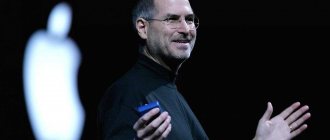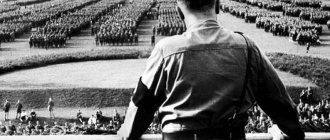The history of the world has already met dozens of specialists in oratory, whose speeches we still remember. The most recent geniuses of this art were Hitler, Khrushchev and other politicians who carried out propaganda performances. More often than not, it is politicians who provide an example of how to properly turn ordinary speech into something more, an element of history. You should know that writing texts for speeches brings money, because the topic of the speech can be any, including making money.
But it is not always the case. For example, the last “powerful” speech was given by Steve Jobs in 2005, and it was not a presentation of a new product. Through oratory, he encouraged Stanford University students to strive for their dreams and to look for opportunities in life's failures. Using speech techniques, Jobs touched on vital topics, winning over the audience, and the speech went down in history.
For some, this is a hobby, while others study elocution so that the presentation will receive the highest marks and be useful.
Excerpt from the main part of Steve Jobs' speech
“Sometimes life hits you over the head with a brick. Don't lose faith. I'm convinced that the only thing that kept me going was that I loved it. You need to find what you love. And this is as true for work as it is for relationships. Your work will fill most of your life, and the only way to be completely satisfied is to do what you believe is great work. And the only way to do great things is to love what you do. If you haven't found your business yet, look for it. Do not stop. As with all matters of the heart, you'll know it when you find it. And like any good relationship, it gets better and better over the years. So search until you find it. Do not stop".
“Your time is limited, so don't waste it living someone else's life. Don't fall into the trap of dogma that tells you to live in other people's thoughts. Don't let the noise of other people's opinions drown out your inner voice. And most importantly: have the courage to follow your heart and intuition. They somehow already know what you really want to become. Everything else is secondary.” “Stay hungry. Stay reckless."
If you analyze any speech of Steve Jobs, you will notice that it resembles a conversation - it is very understandable, natural and relaxed. Constant pauses, which are an integral part of speech, add emotionality to the text.
Despite the fact that this speech is considered one of the best delivered in modern times, some experts believe that Jobs lacks the correct gestures and body movements and the speech is not the limit of oratory. But we should not forget that for this person this was not an activity, rather it was a hobby and responsibilities as the owner of the company. By the way, the presentation of new technology always looked very exciting.
Summary
There are no small details in public speaking. Even the science of proxemics was formed - the science of the temporal and spatial organization of communication. Even the placement of furniture (tables and chairs) plays a big role, because you can stand in such a way that you feel separated from the audience; you can set up a table and seat the listeners at it so that you create, as it were, two confrontational sides; You can use furniture to create a conference atmosphere, etc. This is unacceptable: modern trends in the development of public speaking imply dialogism.
We observe in the media public speeches based on a dispute, including parts of interviews, discussions, polemics... This is quite in the spirit of ancient traditions! Dialogical presentation is very important for lawyers, sales representatives, and middle managers. However, don’t think that this is some kind of know-how!
In Mamin-Sibiryak’s novel “Privalov’s Millions,” the son of a small merchant asked his father for help in opening his own shop. The father said that if his son could convince his friend, a very stingy merchant, to buy from them a harp that no one had needed for a long time, then the son could count on his help. And the son thought through his “performance”, positioning himself with a harp right on the porch of the stingy merchant’s house. He paid a beautiful girl he found who knew how to play the harp, and when the merchant arrived at his house, this public performance was a success: the girl played so tenderly that the “organizer” of the performance did not have to say anything: the effect of surprise worked! — The harp was purchased, and the “sellers” were invited to the merchant’s house. Thus began the young man’s independent journey...
So, organizing a public speech is a matter to which you can devote your life, constantly improving in such a complex and necessary art.
What does oratory consist of?
If the topic of eloquence is a hobby for you, then you don’t need to delve too deeply into the intricacies, but you should know the main components of a good speech.
- Preparation. The key to a successful performance directly depends on your preparation for it. The clothes in which the performance will take place require careful selection.
It is important for a girl not to wear a lot of makeup and have a modest appearance. This will position the audience and will not distract attention.
It is important for men to look neat and ironed. Show success and confidence, otherwise the listener may simply not attach due importance to the words.
You need to pay attention to elements depending on your audience. After all, for businessmen, money and the high cost of style will be an important element. For schoolchildren or students, a simpler and more relaxed look is suitable.
- Introduction. You can start with a life story or an unusual phrase that should hook the listener. This technique is called a "hook". The Steve Jobs speech we talked about above had a hook in the form of a joke.
Always use pauses between main parts of speech. This helps you digest what was said and at the same time you can see people's reactions.
The art of oratory is based on the ability to draw images, but only the right images. It has to be something that can be specifically represented, and if it involves numbers, then it needs to be used on slides or translated into something that can be visually measured.
- Main part. Of course, there are no specific rules for the main part, but a couple of tips can be given. Break up your speech in a logical way so that it is clear where you transition into another part of the speech.
Don’t make your speech a monologue, otherwise the listeners will simply get bored and feel like guests. Ask rhetorical or direct questions, draw someone from the audience into a conversation, or call them on stage. Ask to do some task. Speak with energy.
- Conclusion. You can end your speech with a beautiful phrase or take a step back. There is no need to drag out the conclusion and say something else.
You can emphasize the main thing from the speech and begin to lower the tone at the end. Then everyone will understand that the performance is over. The art of concisely and clearly ending a speech requires mandatory practice.
- Personal examples and stories. Now it is difficult to surprise with some facts or insert into the text of the main part something completely new for the target audience.
Therefore, personal stories are on a par with pauses and images in the fundamentals of the art of successful speaking. Let's say if you are a businessman, then it would be good to tell how you made your first money. By telling a story from your life, you bring the viewer closer to you, giving you the opportunity to imagine themselves in your place. And if you write your speech correctly, then you can integrate key points into the story and convey the necessary information to the viewer.
Money as the goal of oratory
Currently, trainings and seminars discussing the topic of how to make money have flooded the Internet. In fact, the Internet contributed to this. It opened up opportunities for earning money, and therefore for learning. After all, before, the main source of independent learning was the book.
An example of millionaires' speeches at universities or online seminars on the Internet - all this relates to business topics where the main goal is to make money. The purpose of these speeches is to motivate the listener, charge them with emotions and the desire to do something. All this is driven by the desire to have a lot of money and be independent. A good way to convert knowledge of oratory into money is to open a school for the practice and study of eloquence.
Judicial speech
Judicial speech as a genre came to us from ancient Greece. Due to population growth, politicians studied oratory, and judicial speech was of great importance at that time. A politician's fate could be decided by his ability to speak in public. In Greece, training in this skill took place and they paid a lot of money for it.
Since in the courts at that time everyone had to defend himself, citizens who had money paid logographers for the text, and judicial speech allowed them to avoid punishment.
A judicial speech, like any other, consisted of an introduction, a main part and a conclusion. The man thus tried to pity the judges and make them believe that his judicial speech was not fictitious.
Judicial practice in ancient times was the property of the people, and many people gathered at the trial, so it was problematic to speak without proper preparation.
Judicial speech as a genre takes place and develops in modern times and can bring money to professionals. All prosecutors and lawyers prepare the text of their speech in advance; this is what distinguishes a good lawyer. To make a judicial speech impress the judge and jury, rhetorical techniques are used.
Pavel Vlasov
A public speech, well structured and carefully prepared, can greatly influence the public worldview and give results that the author-speaker himself did not even imagine. So, for example, in the novel by A.M. Gorky's "Mother" Pavel Vlasov, arrested on political charges, refused to escape, prepared by his comrades, in order to make a speech at the trial! And he thought it through painfully. He didn’t care what sentence they would give him, but there was a goal - to convey his faith to a large number of people. If you analyze his speech, you can use it to teach oratory.
Pavel understood that his speech would be in court, so he began with this opening: “A man of the party, I recognize only the court of my party...”, and with this one phrase he immediately placed himself above the circumstances and above the power that was judging him. It was as if he had grown taller – and the hall froze. His speech is divided into clear parts, each of which begins as if with a refrain: “We are socialists...”, “We are workers...”, “We are revolutionaries...”, and this “refrain” increased the emotional tension so much that “everyone felt a strange , the captivating power of his faith,” writes Gorky.
The novel, undeservedly forgotten, provides an excellent example of the internal dramaturgy of the hero’s speech: Pavel thought through not only the beginning, but also the beginning (“We were arrested as rebels...”), and the climax (“How can you destroy the workers - those who you, comrade judges, feeds?..."), and the denouement: Pavel’s speech ended with the life-affirming “And this will be!” - you can’t add anything, everything is said, everything is clear, everything is exhaustive. Constructing such a speech is worth a lot.
Example of Lincoln's speech
In 1863, a few months after the bloody battle, Lincoln delivered the famous Gettysbury Address. There is no need to talk about oratory and the attitude towards professional rhetoric; there simply wouldn’t be enough room for techniques. But the text written by Lincoln made tears flow and touched the soul
The public speech lasted only about two minutes, but history will not forget these two minutes. As a result, this speech was carved on a monument at the Lincoln Memorial.
“Eighty-seven years have passed since our fathers founded on this continent a new nation, born of freedom, and dedicated to proving that all men are born equal.”
“We are now undergoing the great test of civil war, which will decide whether this nation, or any nation like it by birth or calling, is able to stand. We came together on the field where the great battle of this war raged. We have come to consecrate a part of this land - the last refuge of those who gave their lives for the life of this nation. And this in itself is quite appropriate and worthy.”
“But still it is not in our power to consecrate this field, to make it sacred, to spiritualize this land. Thanks to the deeds of the brave men, dead and alive, who fought here, this land is already sacred, and it is not in our humble power to add or subtract anything. What we say here will be only briefly noticed and soon forgotten, but what they did here will never be forgotten. Let us, the living, devote ourselves to the unfinished work that these warriors accomplished here. Let us dedicate ourselves here to the great work that lies ahead of us, and become even more determined to give ourselves to the purpose to which those who fell here gave themselves wholly and to the end. Let us solemnly swear that their deaths will not be in vain, that this God-protected nation will have its freedom restored, and that the government of the people, by the will of the people, for the people will not perish from the face of the earth.”
Historians say that Lincoln decided to write the text for his speech himself, taking as a basis the principle of equality from the Declaration of Independence and relying on the great figures of the past. According to eyewitnesses, the performance was so strong that it made the people believe that all the sacrifices were not in vain, and they were not fighting against other states, but were fighting for the freedom of the people and the future of their native state. Just one text allowed people to unite as a family to resist the enemy.
Kony's example
For example, one of the founders of the Russian legal profession, A.F. Kony, once defended in court a disabled hunchback who caused grievous bodily harm to his neighbor, who, day after day for many years, called him a freak when the disabled person passed by his house. The defendant, who had never responded to an insult, suddenly could not stand it one day, grabbed a stone and threw it at his offender, breaking his head. And at the trial A.F. Kony thought of an original public performance. He stood up and addressed the jury: “Gentlemen of the jury!” - and fell silent. After a pause, he repeated his line and fell silent again. Then again too. The assessors whispered nervously, and after the fourth such appeal they shouted at A.F. Kony: “Are you kidding us?” Then Koni said: “I addressed you politely only 4 times, and you were already nervous. And how should my client feel, listening to insults day after day for many years?” The disabled man was acquitted. Public speech by A.F. Kony achieved its goal.
That is why at the first – pre-communicative – stage of the speech, you need to think through its purpose and clearly understand its topic. A.F. Koni knew what he wanted to achieve, since the next algorithm for his preparation was obvious: assess the character of the audience and the situation, and then proceed to the text itself.
The text, as in the case of Koni, should be concise and bright. This cannot be done without a clear understanding by the speaker of what goal he wants to achieve. Thus, shortly before Napoleon’s invasion, Alexander I hosted French diplomats, already realizing that war could not be avoided. The Emperor clearly understood the purpose of his speech: it was necessary to convey to the French the meaninglessness of Napoleon’s undertaking, its doom. His speech was magnificent in its brevity and brightness of impact: “Here is little Europe,” he said, approaching the map hanging on the wall, “but here is big Russia,” he took a couple of steps so that his hand touched the Far East. - In case of failure, you can retreat only to Paris, but I can retreat even to Kamchatka! And at the same time, every inch of this land will be hostile to you, not a single woman will stop fighting. Russia may lose individual battles, but there will never be a defeated Russia.” Ambassadors and diplomats left shocked.
The more precise and expressive the speech, the more preparation it requires. And the point is not only in its speech design: you need to assess the composition of the audience, be able to put yourself in the place of future listeners. And even if the audience is heterogeneous, you need to think through the speech so that no one gets bored, so that the goal of the speech is achieved in relation to everyone.
Example of Chaplin's text
Charlie Chaplin's speech test is called in Russian translation “How I fell in love with myself” and has become our history and the main speech of a person. He said it on his seventieth birthday.
True, there are rumors that in fact the example text could have been written by fans from Brazil. There is no clear evidence that this is the work of Charlie Chaplin, nor is there clear evidence of forgery.
Despite this, the speech on the topic of self-love turned out great and deserves attention - an example that can be used for your own purposes.
“As I began to love myself, I realized that sadness and suffering are only warning signs that I am living against my own truth. Today I know that it is called “BEING YOURSELF.”
When I fell in love with myself, I realized how much you can offend someone if you impose on him the fulfillment of my own desires, when the time has not yet come, and the person is not yet ready, and this person is myself. Today I call it “SELF-RESPECT”.
When I fell in love with myself, I stopped wanting a different life, and suddenly I saw that the life that surrounds me now provides me with every opportunity for growth. Today I call it “MATURITY”.
As I began to love myself, I realized that no matter what the circumstances, I am in the right place at the right time, and everything happens at exactly the right moment. I can always be calm. Now I call it “SELF CONFIDENCE.”
As I began to love myself, I stopped stealing my own time and dreaming about big future projects. Today I only do what brings me joy and makes me happy, what I love and what makes my heart smile. I do it the way I want and at my own pace. Today I call it SIMPLICITY.
When I fell in love with myself, I freed myself from everything that harms my health - food, people, things, situations. Everything that brought me down and took me away from my own path. Today I call it “SELF-LOVE.”
When I began to love myself, I stopped always being right. And that’s when I started making fewer and fewer mistakes. Today I realized that this is “HUMILITY”.
When I fell in love with myself, I stopped living in the past and worrying about the future. Today I live only in the present moment and call it “SATISFACTION”.
When I began to love myself, I realized that my mind could interfere with me, that it could even make me sick. But when I was able to connect him to my heart, he immediately became a valuable ally. Today I call this connection “WISDOM OF THE HEART.”
We no longer need to be afraid of disputes, confrontations, problems with ourselves and with other people. Even stars collide, and new worlds are born from their collisions. Today I know that this is “LIFE”.
How to write a public speech: examples and tips
01/13/202119.08.2021 Elena LitvinenkoPosted in Oratory
In the words of Napoleon Bonaparte: “He who cannot speak will not make a career.” At all times, people respected those who knew how to speak and capture the attention of listeners. Today, the ability to speak beautifully is necessary not only for actors and politicians. And it’s logical to start preparing a public speech by composing the text of a public speech, isn’t it?
Internet activities are becoming increasingly important. Bloggers and video channel hosts need to make speeches of various types for video recording; trainers and experts need to speak online at webinars, record training materials and sales videos.
Smart people understand this, and many have repeatedly said that mastery of the word is the main weapon with which political and advertising campaigns are conducted. Therefore, the importance of the ability to briefly and succinctly express your thoughts cannot be overestimated.
As you know, the purpose of public speech is to bring a change in the behavior of listeners and spectators, to influence their minds and feelings. Therefore, you should first decide on the genre of your speech.
Modern classification of speeches by genre
1. Socio-political speeches
- Reports at meetings, conferences, congresses.
- Political and diplomatic speeches.
- Military-patriotic speech.
- Political Review.
- Propaganda and rally speeches.
2. Academic eloquence
- Lectures in higher educational institutions.
- Scientific reviews and reports.
- Information scientific reports.
3. Judicial speeches include
- Accusatory, prosecutorial speech.
- Defender's speech, lawyer's speech.
4. Social and everyday speeches
- Anniversary and congratulatory speeches.
- Toast or table speech.
- Funeral and memorial speeches.
5. Theological-ecclesiastical can be considered
- Church sermon.
- Council speech.
Of course, most often in everyday life we use the social genre. But for work moments these days they are relevant:
- Informational and educational speeches from academic eloquence.
- Persuasive and advertising (selling) speeches with an appeal from the social.
If educational lectures were popular 10-20 years ago, now the interest of a wide audience in them is almost exhausted. Now interactive public speaking is in favor: seminars (webinars), master classes, trainings.
The most popular type of speech for online business is a persuasive short speech with an appeal. This includes various presentations of products and services, invitations to events and even self-presentations.
How to write a public speech correctly
A well-written speech always has a 3-part form: introduction, main part and conclusion. Even in ancient times, when the science of rhetoric was held in high esteem, special attention was paid to the beginning of a speech, which was then and is now recommended for speakers to memorize.
Even though you may spend the most time creating it, it should sound very natural. Here are 4 win-win options to get you started:
- An interesting or shocking fact about the topic of the speech. You've probably noticed how speakers you like utter phrases like: did you know... at the beginning of their speech?
- You can immediately focus on the relevance, importance, and usefulness of what you are going to talk about. And it often sounds something like this: I advise you to listen to my speech to the end, because...
- A catchphrase or proverb on the topic would also sound great at the beginning. For example, for the text of this publication I found an aphorism by Napoleon.
- A rhetorical question is a great way to start a speech, especially when it touches on a pressing issue for the audience you are speaking to.
What elements must be contained in a persuasive speech?
1) Arguments:
- some accomplished facts that can be mentioned;
- numbers, statistics;
- folk wisdom - signs, sayings, phraseological units;
- quotes, opinions of authoritative sources.
2) Justifications – based on human values:
- health;
- children, family, relationships;
- freedom - it is important for people to realize that they are free in their choice, that they have a free schedule, that they are free to do as they want, they have free time;
- Love, relationships.
Both arguments and justifications are very important, because people have different types of perception - some perceive numbers better, for example, while others react better to justifications. The main goal of persuasive speech is to motivate listeners/viewers to take some action.
In order for your speech to convince listeners and not allow them to switch their attention, be sure to use rhetorical techniques: metaphors, comparisons, epithets. Immerse them in a certain atmosphere or circumstance. Give examples, find moments where humor could be used in your speech.
The finale or conclusion of the speech depends on the genre you choose. For informational and educational speeches, it is best to summarize what has been said, as A.V. Suvorov said, “Repetition is the mother of learning.”
Propaganda and advertising speeches always end with an appeal, and it’s unlikely that “Long live peace, labor, May!” will suit you! (although of course you can wish them good health :)). Verbs in the imperative mood, calling to do something, are much more suitable: subscribe, come, take a business card, write down contacts, etc.
IMPORTANT! Never end your speech following the example of Dobrynya Nikitich from the film about 3 heroes: well, just like that...
If you are an expert, a master of your craft, then get acquainted with the persuasive speech algorithm, which argues your opinion with the help of examples. Watch an excerpt from Michael Bang's Mastery of Public Speaking training. Michael Bang, the world's best salesman of the 1990s, founder of the International Selling School and one of the most sought-after consultants in Europe.
Examples of texts for public speaking
Natalie Portman rose to fame at the age of 13, playing the role of a teenage girl in Luc Besson's film Léon, who befriends the hitman Leon (Jean Reno).
She showed her talent in her other works, but finally won the hearts of the audience by playing the role of Padmé Amidala, queen of the planet Naboo in George Lucas' film Star Wars. Episode I: The Phantom Menace."
Natalie Portman's speech (with Russian subtitles) to Harvard graduates 2015
The text of her public speech conveys an important message that she wanted to convey to Harvard graduates - personal development, the only thing at which we can definitely be the best. Personal formation is one of the themes explored in Black Swan, where her character Nina becomes artistically successful when she discovers pleasure in improving herself rather than trying to appear perfect to others.
“Accept your shortcomings in knowledge and turn it to your advantage,” said Natalie Portman and told the story of a famous violinist she knew who told her that he could not become a composer because he knew too many pieces of music and when he started writing notes, he a familiar, already existing composition immediately comes to mind.
Natalie believes that not knowing what graduates will face is one of the advantages. “You can compose because your mind is not yet filled with a huge amount of writing and you do not take many things for granted. The only correct way to do something is known only to you. You gathered here today will achieve many outstanding things. I have no doubts about this."
Steven Spielberg's public speech to Harvard University graduates 2016
“I create worlds that last only two hours. “You are the world that will live forever” – director, producer and screenwriter, billionaire, and one of the most famous people on the planet Steven Spielberg spoke in his speech to Harvard graduates in May 2016.
It took Stephen 37 years to get his degree, all because in his second year of college he was offered his dream job at Universal Studios, so he had to drop out. Then he told his parents that if the movie didn’t work out, he would return to university.
But everything worked out great. And the world saw “Schindler’s List,” “Jurassic Park,” “Jaws” and the Indiana Jones tetralogy. Steven Spielberg returned to university because of his children, of whom he has seven.
Because he insisted, while raising them, on the importance of higher education, but he himself did not go through this path, so at the age of fifty he entered California State University - Long Beach, and still received a diploma. He admits that he got into paleontology thanks to Jurassic Park.
Mark Zuckerberg's public speech to Harvard graduates 2017
Mark Zuckerberg is an American programmer and entrepreneur in the field of Internet technologies, one of the developers and founders of the social network Facebook and the head of Facebook Inc.
The youngest dollar billionaire in the history of mankind, did not graduate from this university, but received an honorary degree of Doctor of Law. Mark Zuckerberg's emotional speech, “The greatest success comes from being wrong,” inspired the whole world.
His public speech contains this key passage:
“In our society, we often don't do great things because we are so afraid of making a mistake that we ignore all the bad things that exist in society today and do nothing. In fact, everything we do will have flaws in the future. But that shouldn't stop us from starting.
So what are we waiting for? The time has come for the things that will define our generation. How about stopping climate change before we destroy the planet and getting millions of people to build and install solar panels.
How about curing all diseases and asking volunteers to track their health data and share their genomes? Today we spend 50 times more on treating sick people than on finding ways to keep people from getting sick. It is pointless. We can fix this."
You can read the full translation into Russian on the Present Time website.
Stages of preparing a public speech
To make a successful public speech, you need 3 main stages of preparation:
- Collection and analysis of information.
- Drawing up the text of a public speech.
- Speech pronunciation training.
We often admire and re-listen to the speeches of great speakers. Were these speeches improvised? No - of course they were prepared!
There is a famous quote from Mark Twain: “It usually takes me more than three weeks to prepare a brilliant impromptu speech.” He was preparing for “what” he would say and “how”. After preparing the meaning of your speech, it is very important to practice pronouncing it.
Even if you have mastered intonation, the emotionality of speech also plays an important role - alternating smiles and seriousness, slowing down and speeding up. It is also important to find logical stresses in this text - on which words you need to strengthen your voice, where to pause.
“What” and “how” are two sides of the same coin. If you have an excellent “what” - meaning, logic of presentation, but the “how” is lame, no one will want to listen to you. And vice versa - with the “how” everything is in order - the speech flows unimaginably, unfortunately, without deep meanings we will never remember this speech, and, moreover, we will not have the idea to take a pencil and start taking notes.
This may be useful to you too:
What does timbre depend on and how to change your voice in life
How to protect and not lose your voice - practical advice from professionals
Speech voice development: exercises for changing pitch
How to correctly use oratorical gestures. Gesture development









